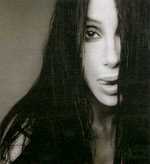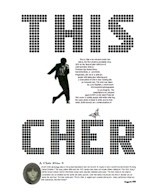 The week before Halloween I went to Lucha Vavoom downtown at the awesome Mayan Theater.
The week before Halloween I went to Lucha Vavoom downtown at the awesome Mayan Theater.
By the way, I love Halloween in LA, so many awesome things to do from the fabulously scary mazes on Queen Mary or at Knotts Scary Farm, to the West Hollywood Parade to the Hollywood Forever Cemetery's Day of the Dead: so many creative LA-types (from Hollywood on one side and the Latino art community on the other) creating really inspired altars, costumes and mazes.
Anyway, on my way to Lucha Vavoom, I was listening to NPR and John Updike was on talking about his  sequel to his book Witches of Eastwick. The new book is called The Widows of Eastwick, which confused me because I thought the gals were already widows in the first book, having killed their first husbands. In the movie, they were simply divorced, a lot less dangerous – their witchery was almost accidental.
sequel to his book Witches of Eastwick. The new book is called The Widows of Eastwick, which confused me because I thought the gals were already widows in the first book, having killed their first husbands. In the movie, they were simply divorced, a lot less dangerous – their witchery was almost accidental.
Updike talked about being asked to be a consultant on the movie and deciding not to be, not even attending any premiers. He saw the movie only once, alone with his wife in Danbury, Massachusetts, after it was released. His wife whispered to him during the movie that he should get his name taken off of the credits. He laughed and said he didn't think it was that bad. But he was embarrassed about the rewrites, that the actors were wonderful (Cher was "lovely as always") but that Jack Nicholson didn't really have enough to do, especially at the end of the movie.
The show's host asked Updike about the new novel and Updike said that the little town of Eastwick becomes more of a character unto itself in the next book, and Updike explains his love for New England, its "brininess and antiquity" which was different from his Pennsylvania landscape growing up.
Updike admitted that Witches of Eastwick was his attempt to appease the feminist criticism of his earlier books but that this effort failed. Feminists didn't like WOE. Making his female protagonists witches does seem misguided if you want to appease feminists, but I think Updike was heartfelt in his attempt. Just clueless about why depicting women as tricksters and borderline malevolent in fact ties in to negative female stereotypes instead of being sympathetic to modern women.
Updike humorously depicts the "half-baked suburban witchcraft" of his witches with the materials of boxes of Cascade to make magic circles.
A caller asked about the short story "Pigeon Feathers." Updike said this was "a heartfelt" personal story about growing up and coming to terms with religion. I read this story in a reading group once and loved it. It is an example of some amazing and skilled American writing.
Another caller asks about his story "The Christian Roommates" a true account of Updike's experiences with his roommates at Harvard I'd like to read.
Cher's big WOE speech: http://www.blinkbox.com/Movies/1241/Witches-of-Eastwick?Scene=12474


Leave a Reply